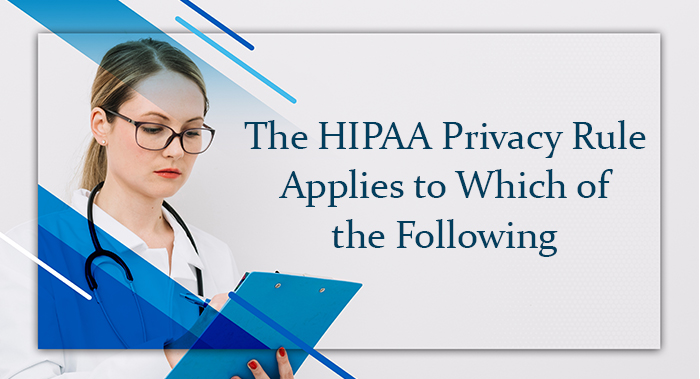
The HIPAA Privacy Rule Applies to Which of the Following
Are you wondering who must comply with HIPAA Privacy Rule? Physicians and healthcare institutions are the primary entities entrusted with patients' intimate and personal information that they expect to keep private and secure. So, what happens if personal information leaks or the rule breaches? Let's dive into this article and clear all the emerging doubts, including the HIPAA privacy rule applies to which of the following?
As we know, HIPAA is a US Federal Law that is also known as Health Insurance Portability and Accountability Act. The purpose of the HIPAA Privacy Rule is to restrict the use and disclosure of information and data pertaining to a patient or consumer of healthcare services. It was commenced by the United States Department of Health and Human Services (HHS) in order to secure patients protected health information (PHI).
Healthcare professionals and patients require PHI at many stages of life, and as per the rule, the entities need to make practical efforts to share and use protected information. Fortunately, with the privacy rule, patients have the right to their health information and medical records. In case any covered entity violates the HIPAA Privacy Rule (willfully or not), it will be a subject of punishment, such as civil action lawsuits, criminal charges, and hefty monetary penalties ranging between $100-$1.5 million per violation.
Does the HIPAA Privacy Rule Apply to You?
If you lie in the covered entities and business associated (BA) category, then HIPAA Privacy Rule applies to you. Subcontractors and business associates of business associates are also bound to follow the HIPAA Privacy Rules.
Covered Entities
Various entities fall under this category, and some of the following are as follows:
- Healthcare providers- Healthcare organizations or institutions collecting protected health information (PHI) of patients must comply with HIPAA Privacy Rule. Doctors, dentists, psychologists, physiologists, clinics, pharmacies, nursing homes, etc., fall under covered entities.
- Healthcare plans- Any organization offering healthcare plans, such as medical insurance, group health plans, and government funded-health plans, including Medicare & Medicaid, etc., are also a part of the covered entity.
- Healthcare clearinghouses- Healthcare clearinghouses that convert PHI data into a uniform format for electronic transmission are also bound by HIPAA privacy standards.
Business Associates
Any person or business associate having access to PHI to disclose or use directly or indirectly on behalf of the service provider to a covered entity also lies in the category to which HIPAA Privacy Rule applies.
Business associates don't have direct contact with the patients as they are linked with the healthcare service providers or covered entities in order to perform their services. Covered entities should execute a business associate agreement (BAA) to safeguard patients' PHI and ensure that the business associates follow HIPAA regulations. In case of HIPAA violation by the business associates, they are directly the subject of the penalty or punishment as covered entities.
What HIPAA Privacy Rule Protects?
HIPAA Privacy Rule comes up with the idea of protecting the patient's personal health information in distinct forms or formats such as files, email, audio, video or verbal communication, or more. It protects names, birth, death date, treatment history and related information, telephone number, addresses, contact details, social security numbers, medical records numbers, photographs, finger and voice prints, and any other unique identity of a patient.
Whether you're a covered entity or business associate, you need to follow Federal Law and comply with HIPAA Privacy Rule. Strict fines and penalties are imposed on HIPAA Violations, from civil to criminal penalties that range as per the violation.
The Bottom Line
You can up your HIPAA Privacy Rule knowledge through various sources, such as attending webinars on HIPAA, attending experts' sessions, and more. With the above information, now you may know the HIPAA privacy rule applies to which of the following. However, Conferencepanel is there to help you update your HIPAA knowledge through the latest webinars. By actively enrolling in our live webinars with industry experts, you can easily be HIPAA compliant.




